The best POS system for liquor stores is Square POS, for its fast setup and ease of use, as well as its sleek hardware options and generous free plan. On top of that, it provides tax reporting, so you can stay on top of your state’s liquor regulations without concern. However, if you’re running a large liquor store or sell stock across multiple channels, we’d recommend Shopify instead.
Running a liquor store in 2026 means navigating strict legal regulations, managing complicated inventories, and remaining profitable among increasing competition. While the path to success will never be straightforward, the right POS system will help to streamline core operations for liquor stores, reducing headaches as a result.
We’ve put all the best POS systems through their paces, focusing on features like age verification, advanced stock management, and security integrations, to compile a list of the best choices for liquor stores. Read on to learn about our top picks, or get a personalized POS quote from the industry’s best providers.
Overview of the Best POS Systems for Liquor Stores
In the table below, you’ll find a quick at-a-glance overview of the best POS platforms on the market for liquor stores. Throughout the rest of the article, you’ll find a detailed breakdown of each provider, with a close look at the features that make them perfectly suited to running a liquor store in 2026.
| Starting price The typical lowest starting price. The lowest price available for your business will depend on your needs | Free trial | Tech.co retail rating Score out of 5 for general retail suitability based on Tech.co's independent market research. | 24/7 support | Key benefits | Drawbacks | |||
|---|---|---|---|---|---|---|---|---|
| BEST OVERALL | ||||||||
| Free (but transaction fees apply) | ||||||||
| 30 days | 90 days | Demo only | 3 days | 14 days | ||||
| 4.8 | 4.5 | 4.5 | 4.3 | 4.1 | ||||
| | | | | | ||||
|
|
|
|
| ||||
|
|
|
|
| ||||
| Try Square | Compare Quotes | Try SumUp | Try Shopify | Compare Quotes |
Why Should You Trust Us?
The Tech.co team pours hundreds of hours into researching the best POS systems because it’s the only way to ensure we’re providing our readers with the most accurate, up-to-date information possible.
We’ve spoken to daily POS users working in restaurants, retail, and more, and have tested out more than 20 point of sale platforms ourselves, paying close attention to everything, from the quality and feel of the hardware to how easy the software is to use, to help you make a clear decision for your business needs.
When determining which systems will be able to meet the needs of liquor stores specifically, we prioritize features like inventory management, employee permissions, and analytics, and also check for the presence of specific features like ID verification systems.
Head over to our methodology section to learn more about our product review process, which is one of the reasons more than one million users consult our articles every month.
Best POS Systems for Liquor Stores
In order to meet the steady demand of liquor store business, owners need reliable POS systems they can depend on year-round, which is why we tested every suitable POS system for liquor stores and rated them across multiple categories in order to determine how each one compares. Here are our top providers:
- Square – Best overall POS system for liquor stores
- Clover – Best for rapid expansion
- SumUp – Best value for money
- Shopify – Best for extensive, varied inventories
- Lightspeed Retail – Best for improving customer loyalty
1. Square
- Best POS for liquor stores overall
- Price from: Free
Square POS is the best POS system for most liquor stores: it’s easy to use, offers a robust feature catalog, and includes excellent employee management tools.
On top of this, its free plan is one of the most generous in our research, which makes it ideal for new liquor stores that want a genuinely useful POS without shelling out hundreds of dollars in overheads.

Pros
- Free to get started
- Slick and stylish hardware that impresses customers
- Serves businesses of all sizes and in all sectors
- Strong analytics, inventory, and third-party integrations
Cons
- Some necessary features for mid-sized businesses cost more
- 3.5% + 15¢ charge for keyed-in transactions
- Support options vary by plan
- No monthly fees. Charges transaction fees instead

- 2.6% + 15¢ fees for card transactions

- 3.3% + 30¢ fees for online transactions

Why is Square good for liquor stores?
Having tested the software ourselves, we’d actually say that Square POS is the only option on this list with a good enough free plan to manage the needs of liquor stores. However, we would recommend its paid plans, as they offer much more competitive transaction fees — the exception being if you’re running a small pop-up or convenience store.
Other free plans, such as that offered by Toast, have serious limitations that will not suit a liquor store. Among them, the lack of in-depth reporting and analytics will not suit businesses with complex inventories or a high volume of sales.
On its free plan, Square offers detailed tax reporting, useful for any business that deals with state and federal liquor tax. Other features that will make your life much easier include automatic restocking, which ensures your store won’t run out of its most popular beers, wines, and liquors.
Businesses that are based in rural areas sometimes have issues with connectivity, which is why Square still accepts payments even when not connected to the internet. This will mean that those with an unreliable network won’t be penalized by an inability to take payments.
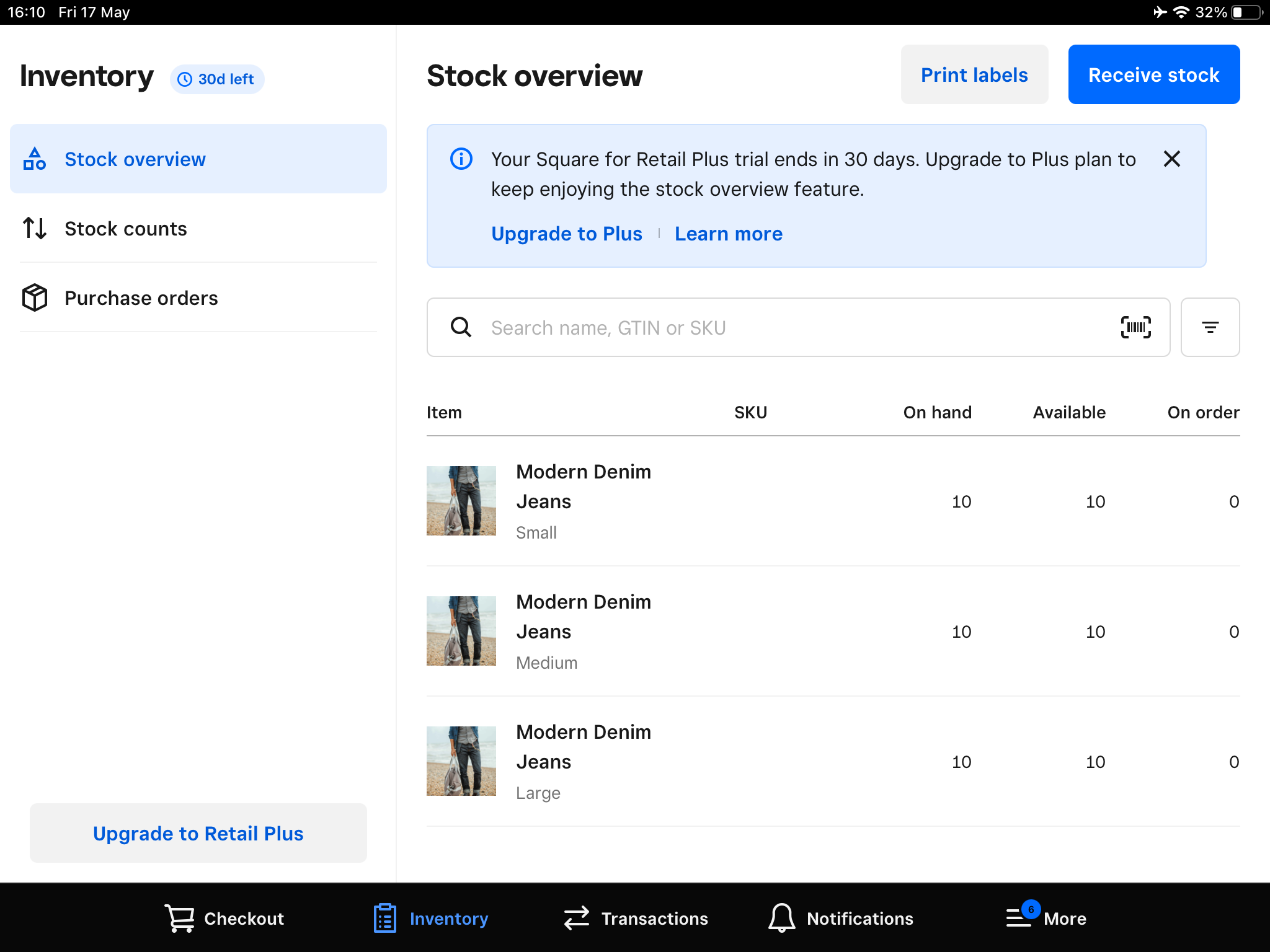
The inventory management system is comprehensive, even for beginners, whether you’re selling liquor or jeans. Source: Tech.co testing
Importantly, Square’s paid retail plan – Square Retail – also lets you set age restrictions on items and set up verification processes for purchases, making it easier for you to adhere to legal regulations. If you’re selling online, the provider’s website builder, Square Online, also has a customizable age verification pop-up to restrict access for underage users.
Serving minors is an absolute non-starter for any fledgling liquor business, with punishments potentially including jail time, depending on your location. That’s why Square will also allow you to scan IDs at the point of checkout to verify that the customer is really the age they claim to be.
Liquor store owners have a diverse set of needs. This time-poor demographic often has to juggle multiple different responsibilities, including stock taking, accounting, maintaining legal compliance, and offering customers a bespoke level of service.
That’s why Square’s comprehensive feature set will mark it out as a great potential solution. For instance, you’ll be able to keep accurate inventory, even if you sell your products in different quantities to how they’re purchased.
Square’s inventory features are decent, but they can’t compete with the likes of Shopify and SumUp, which both offer robust stock management features geared towards larger businesses with complex inventories.
What’s more, you can seamlessly create and send purchase orders, as well as set up recurring ones for when stocks of a particular product are dwindling. All of this will allow you to keep on top of business – even as the customers pile up.
Due to these impressive features and Square’s affordable price-tag, our research found that Square is our best-rated retail POS system in general, suggesting it will be up to the task if you’re selling other goods alongside liquor too.
Learn more about the popular system in our Square POS review.
How much does Square cost?
Pricing from: Free, but 2.6% + 10¢ per transaction
Since profit margins for liquor stores tend to be on the lower side, finding a cost-effective POS is a huge bonus. Square understands this concern and offers a free POS package that only charges businesses a percentage of each transaction, allowing them to keep overheads as low as possible.
For those after more advanced inventory and business growth functions, Square also offers a Plus package that retails at $89 per location, per month, and a Premium package with custom pricing.
What’s more, while the flat-rate transaction fees help small operations save costs, large companies will have more transactions and more fees — if you’re in charge of a large business, consider Lightspeed POS instead of Square.
2. Clover
- Best for rapid expansion
- Price from: $14.95 per month for virtual terminal
If you’re hoping to turn your liquor store into a retail empire, Clover has the tools to help you do it. This POS provider offers an extensive app store to help you facilitate growth, with a great range of third-party integrations for taking your liquor store to the next level, including tools for inventory management, reporting, and ecommerce.

Pros
- Great for companies that started online but need a physical presence
- Good range of hardware options
- 90-day free trial (software-only)
Cons
- Need pre-existing website, unlike, for example, Shopify
- Additional features cost extra and can become expensive
- No inter-store transactions
- Cheapest plan: $14.95 (virtual terminal)

- Cheapest Retail plan: $16/month

- Cheapest Restaurant plan: $135/month

- Transaction rates from 2.3% + 10¢

Why is Clover good for liquor stores?
When we tested out Clover, we were impressed by its seemingly endless array of external add-ons, which are all sorted into useful categories. Integrating the software with your POS system was quick and straightforward too, all you have to do is click ‘Connect’ on your chosen add-on, and the app will become available almost instantly.

I was really impressed with how many integrations Clover offered when I browsed it. Source: Tech.co testing
Beyond that, Clover also boasts some of the best hardware options across our research. The top-quality terminals offer advanced features, like fingerprint scanning for fast staff logins and haptic feedback, so your team is confident that every button press actually works. It also offers its own brand of receipt printers, which no other provider on this list can say.
Even better, if these hardware costs are a bit too much from a financial standpoint, you can finance them and pay a smaller monthly fee, in addition to the monthly cost of the software.
And what’s more, they look great! All of Clover’s hardware is sleek and easy on the eye, meaning that it certainly won’t look out of place in your store. For premium businesses that place an emphasis on the customer experience, such as an antique wine dealership, Clover will ensure a pleasing checkout experience for high-end customers, who are accustomed to the finer things.
Find out more about this user-friendly POS system in our Clover POS review.




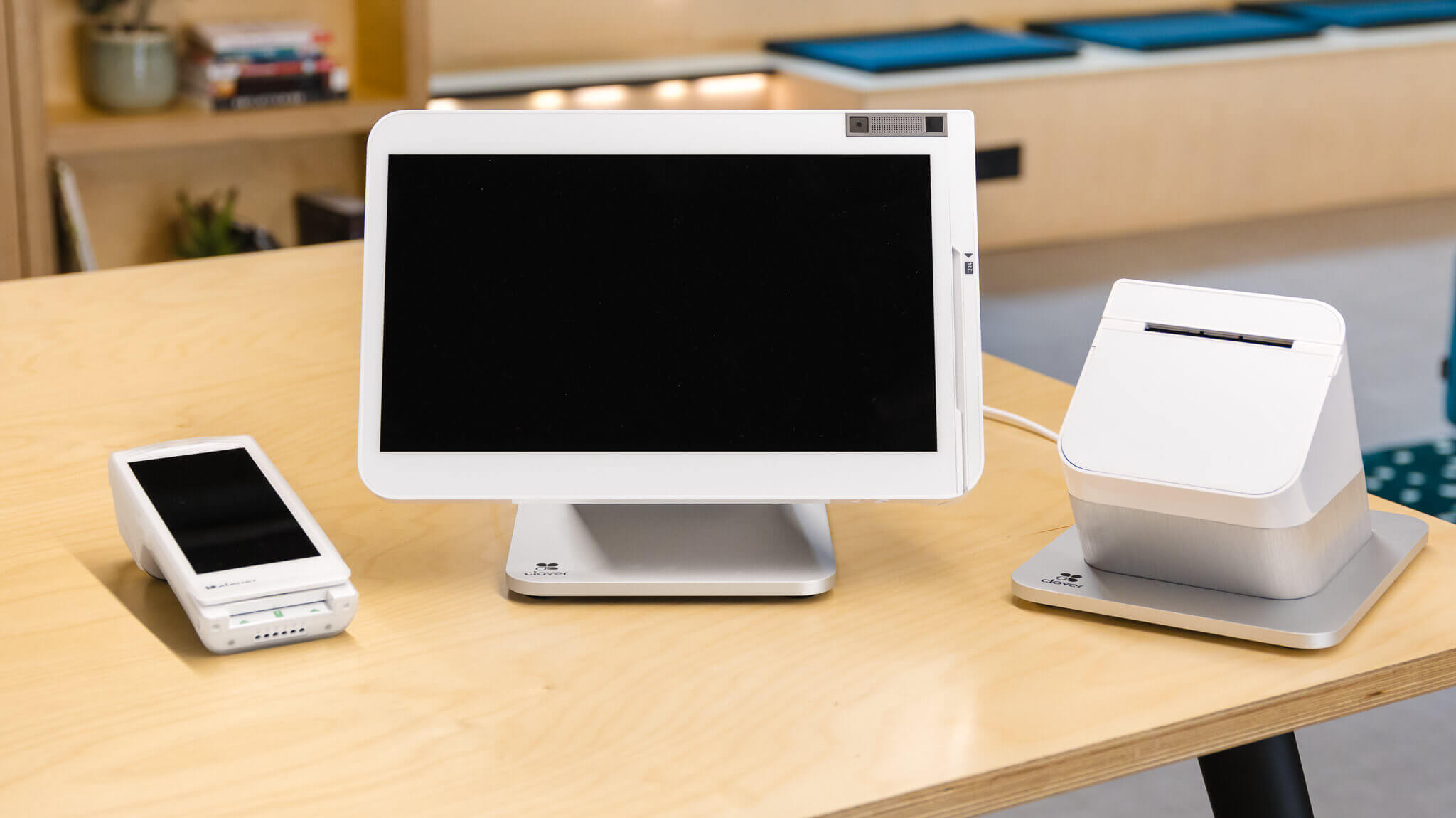

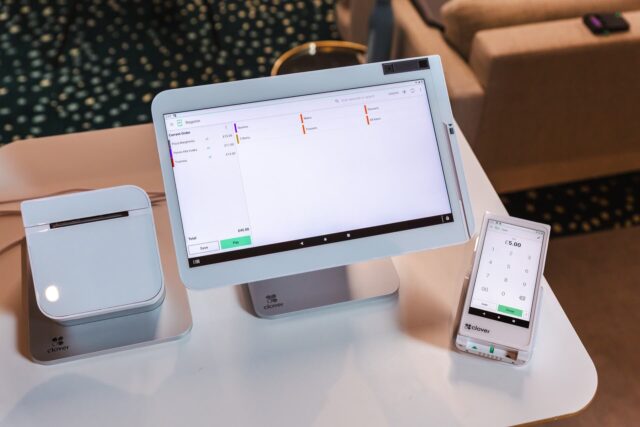


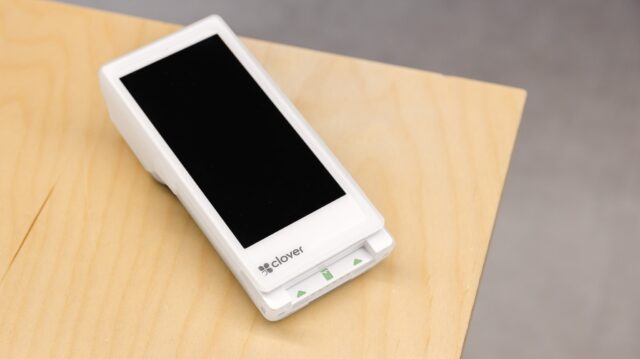
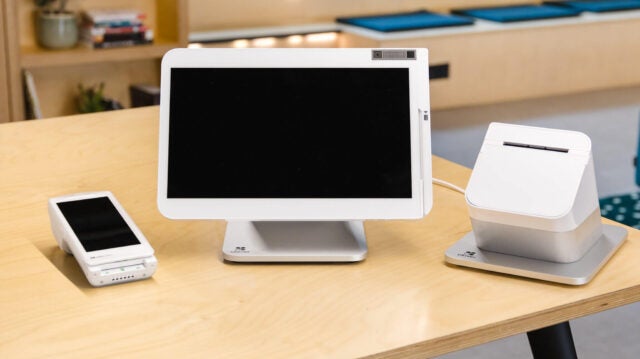

A selection of Clover hardware, in all its glory. Source: Tech.co original imagery
How much does Clover cost?
Pricing from: $14.95 per month for virtual terminal
Unlike Square and Lightspeed R-Series POS, Clover doesn’t offer a free trial. While some customers can get started with Clover for $14.95 per month, liquor stores will need to commit to at least $16 per month for 36 months for a plan better suited to their needs — the Retail Basic plan. Customers will need to pay 2.5% + 10¢ per transaction too.
If you’re in need of more advanced hardware and software options, Clover’s Standard plan offers improved inventory and reporting features, plus access to a Station Duo POS system, for $180 per month for 36 months, plus 2.5% + 10¢ per transaction.
Clover Advanced, on the other hand, includes Clover’s full suite of features and access to a Station Duo and Flex, making it more appropriate for large or chain liquor stores. However, it’s on the higher end of the pricing spectrum, costing $240 per month for 36 months, plus 2.5% + 10¢ per sale.
Read our Clover pricing guide for more information
3. SumUp
- Best value for money
- Price from: $99 per month
SumUp is a great POS solution for liquor stores on a budget. It has a simple pricing structure, with three simple software and hardware packages — POS with Connect Lite ($99 per month), POS with Connect Plus ($199 per month), and POS with Connect Pro ($289 per month).

Pros
- Great range of hardware accessories for in-person selling
- Low monthly costs for small businesses on a budget
- Excellent stock management to track your inventory
Cons
- No customer display option
- No restaurant reservation system
- No handheld POS option
- Free to install

- Hardware and software packages from $99/month

- 2.6% + 10¢ for transaction fees

Why is SumUp good for liquor stores?
You’ll also incur flat transaction fees across all plans — 2.6% + 10¢ per in-person transaction and 3.5% + 15¢ per online transaction or manual entry.
It is this transparency that really sets SumUp apart. While other options on the market, such as Clover, have convoluted plans and pricing structures, SumUp is easy to understand. You also won’t be penalized with higher transaction fees for opting for a lower-priced plan, which is not the case with providers like Shopify and Square.
In terms of liquor store-friendly features, SumUp has a few neat tricks up its sleeve. For example, you can keep on top of your inventory with advanced stock management functions, including an unlimited stock keeping unit (SKU) count.
What’s more, SumUp will give you access to some great sales analytics tools so you can learn what your customers are loving — and boost your revenue in the long term. Detailed sales reports will help you identify high-value customers, which of your stores (if applicable) is selling the best, and your best and worst-performing products.
These advanced analytics tools will come in particularly handily for big liquor stores with complex inventories, as you’ll be able to closely monitor the performance of all your products, which can number the hundreds. A smaller, more bespoke store with fewer best-selling products might not need this depth of insight.

We were able to easily view sales history on the SumUp POS system. Source: Tech.co testing
How much does SumUp cost?
Pricing from: $99 per month
SumUp has three hardware and software bundles on offer. The starter plan, POS with Connect Lite, is available for $99 per month. After that, POS with Connect Plus will cost you $199 per month, and the final plan — POS with Connect Pro — costs $289 per month.
In terms of transaction fees, SumUp is pretty reasonably priced. Notably, you’ll get the same flat rate across all plans — 2.6% + 10¢ per in-person transaction and 3.5% + 15¢ per online transaction or manual entry. This makes it really easy to understand exactly how much money you stand to make per each transaction.
As you would expect, your level of functionality depends on which plan you opt for. With the first plan, for instance, you’ll unlock a cloud-based POS system, alongside a comprehensive customer database and dedicated installation and training.

Pros
- Very strong ecommerce integration
- 24/7 support via phone, live chat, and email
- Works with lots of different hardware options
Cons
- Exclusively-focused on retail and ecommerce
- Charges transaction fees unless you're using Shopify's own Payments processing system
- No offline mode
- $1/month for first 3 months

- Plans available for $29/month

- 2.4% + 10¢ card transaction fees

Why is Shopify good for liquor stores?
Business owners will be able to keep an eye on their stock levels online and across multiple sites, when applicable. This includes monitoring stock that is incoming, reserved for a particular customer, damaged and in need of replacing, and more.
Furthermore, with detailed sales insights, you’ll be able to identify your hottest products and make informed purchasing decisions to make sure that you’re improving your bottom line.
In our research, we found that Shopify actually has the best software offering across all POS providers for online stores, offering robust functionality for employee management, customer engagement, analytics, and third-party integrations.
As a matter of fact, you can actually start selling online for as little as $5 per month with the Starter plan, although this won’t be suitable for businesses with a physical presence.
Opt for one of Shopify’s more expensive plans, however, and you’ll get the benefits of omnichannel commerce. In other words, you’ll be able to sell in-store, online, on social media, and via marketplaces. And no matter where you make your sales, your inventory will always be up to date.

We found the ordering interface for the Shopify POS simple and straightforward. Image: Tech.co testing

We found it easy to add products in Shopify with basic categorization features. Source: Tech.co testing
Another spot where Shopify shines is the help and support options. You can reach them in all the standard ways, like phone, email, live chat, and even social media. On top of that, Shopify offered one of the best knowledge centers across our research, providing necessary information with comprehensive search functionality.
It’s worth noting that Shopify is an ecommerce website builder first that offers a POS system along with it, similar to Square, although Shopify’s ecommerce platform is far more advanced. As a liquor store, you might not necessarily need online store functionality at the present time, but it never hurts to have the option.
Find out if the system is right for you in our Shopify POS review.
How much does Shopify cost?
Pricing from: $5 per month
The Shopify POS Pro plan starts at a pricey $89 per month, but a more limited Shopify Lite plan is only $5 per month (with per-transaction fees that start at 1.5%). Add in the fact that the service is compatible with most POS hardware, and it’s a great way for a small business to save on costs.
The Shopify website builder supports liquor sales as well: liquor store managers will be able to set up shipping restrictions in their Shopify admin panel to meet state regulations, and can include an age verification pop-up window on their website.
5. Lightspeed Retail
- Best for retaining loyal customers
- Price from: $89 per month
Lightspeed Retail is our pick of solutions for liquor stores that want to operate lucrative loyalty programs. Success is driven by retention, which is why Lightspeed Retail includes loyalty program functionality across its Core and Plus plans.

Pros
- Ideal for multiple retail stores with barcoded inventory
- Straightforward pricing with no hidden fees
- Extensive app store for users to expand customer engagement
Cons
- Slightly more expensive than some rivals
- Harder to use for restaurants, florists and businesses without barcodes
- Doesn't integrate with weighing scales
- Basic: $89/month

- Core: $149/month

- Plus: $289/month

Why is Lightspeed good for liquor stores?
This built-in loyalty system will award customers with points automatically, encouraging them to return to earn more as they shop.
In fact, the loyalty system from Lightspeed offers the most features of any loyalty program in our research, including automated campaigns and personalized messaging that are not found on Square or Clover. Even better, if you’re willing to pay a bit more, you can automate these features in tandem with your marketing system to see some serious growth.
In addition to its raft of loyalty features, Lightspeed’s overall software package really stands out among POS systems across the market. Its range of features covers all the core areas a liquor store needs, from business development tools and management abilities to till features, like barcode setup and product variants.
Since handling large, varied stockpiles is one of the biggest burdens liquor stores face, Lightspeed’s granular inventory features solidify its position as a top POS systems for liquor stores. For instance, users can buy by the case and sell by the bottle, and low-stock alerts can be triggered to let managers know when a big seller needs to be restocked.
What’s more, staffers can be prompted to request an ID check with every liquor purchase, and the platform has several other useful, liquor-store-specific integrations, from ID verification for age-restricted sales to a delivery, shipping, and in-store pickup functionality.
Lightspeed lets you accept multiple payment methods on each of its plans, including Visa, Mastercard, Amex, Apple and Google Pay, PayPal, and Tap to Pay.

We found the ordering system on Lightspeed Retail clear and concise, for sunglasses as well as liquor. Source: Tech.co testing
Ultimately, it is Lightspeed’s integrated customer rewards system and omnichannel loyalty tools that make it a good pick for your liquor store.
Read our Lightspeed POS review for more information.
How much does Lightspeed cost?
Price from: $89 per month
Lightspeed costs $89 per terminal, per month, under the Basic plan, although more features are available with the other two plans, Core at $149 per month, and Plus at $289 per month.
All plans include the same transaction fees: 2.6% + 10¢ with card and 2.9% + 30¢ without a card present.
How to Choose a Liquor Store POS System
The most important POS software feature a liquor store needs is age verification. The business could be fined or lose its license if it sells alcohol to any underage customer, so the cashier must be able to quickly and easily verify IDs. A simple pop-up can work, but a POS system that integrates with ID scanner hardware is most effective.
You’ll also want complex stock management tools that account for discounts, two-for-one deals, and liquor taxes, which vary by state. These tools should also be able to track case breaks — when the store buys a case of wine or beer, but sells it by the bottle.
Finally, you’ll want a POS system that tracks all the data you need in order to ensure you remain compliant with local and federal laws covering liquor licenses. The legality of on-demand alcohol delivery varies by state, too.
How We Reached Our Verdict
For liquor store POS systems, we gave extra weight to the most industry-relevant features, like age verification and stock management. Overall quality across all categories remained the key factor.
We take our impartial research and analysis seriously, so you can have complete confidence that we're giving you the clearest, most useful recommendations. After identifying the most relevant, popular POS platforms on the market, we put them through their paces with hands-on testing to better understand their strengths and weaknesses.
In total, we put 16 POS systems to the test, with a vigorous research and testing methodology. We carried out 40 user testing sessions, which amounted to 720 hours of testing in total.
In these sessions, participants were asked to carry out tasks on POS software and describe their user journey, to help us understand what it's like to use the systems first-hand. In addition to first-hand testing, we developed a detailed methodology that focuses on six categories of investigation, including criteria like software features and help and support centers.
These categories were broken down into a further 41 subcategories, so we were able to drill down further into certain topics, to make our insights as granular and useful as possible. Here’s an overview of our main testing categories for POS systems:
- Software features: The capabilities provided by the POS product. Includes general features like ordering and payment functionality, as well as industry-specific tools like KSU uploads, inventory-level stock tracking, and kitchen display system (KDS) software.
- Hardware: The quality of a POS system's hardware selection. The presence of an own-brand terminal, as well as hardware accessories like KDS, receipt printers, and barcode scanners.
- Pricing: The cost associated with acquiring and using the POS system, such as the initial purchase cost, transaction fees, licensing fees, subscription plans, and any additional charges or ongoing costs.
- Ease of use: We test out the software to gauge how intuitive and easy to use it is. We also consider how easy the software is to navigate, and whether any errors took place during testing.
- Help and support: The assistance and resources available to users when they encounter issues or need guidance while using the POS system, including documentation, tutorials, or knowledge bases.
- Customer satisfaction: The aggregate score from customer review sites like Trustpilot and TrustRadius, to understand how POS providers are viewed by their own customer bases.
When it comes to calculating a product's final score, not all testing areas are weighted evenly, as we know some aspects matter more to our readers than others.
For example, we’ll prioritize certain industry-specific features for specific reviews, like an offline mode when reviewing POS systems for food trucks, or KDS when reviewing restaurant POS systems.
At Tech.co, we have a number of full-time in-house researchers who re-run this testing process regularly to ensure our results remain reflective of the present day.
Verdict: What Is the Best POS System for Liquor Stores?
Our top liquor store POS pick is Square, for its ease of use, easy setup, and reasonable flat-rate pricing, but there are lots of great options to choose from depending on your particular needs.
Since each of the POS systems listed here is best for a specific benefit or use, any one of them might be right for you. But you won’t know the exact cost of any of them unless you get a custom quote for the locations, terminals, and features you need.
When you’re ready for that next step, get a quick, free, bespoke POS quote from our team of in-house specialists.





